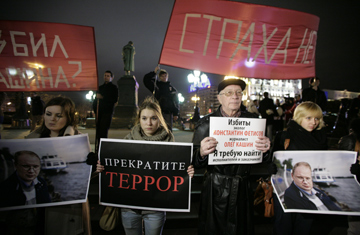
Political activists rally on Pushkin Square to demand a full investigation into the beating of journalist Oleg Kashin, while holding his portrait and posters and declaring "Stop terror" and "We have no fear" in Moscow on Thursday, Nov. 11, 2010
On the evening of Nov. 5, Russian journalist Oleg Kashin posted a link on his blog to a series of videos showing him and other prominent Russians reciting the guarantees of the Russian constitution: freedom of speech, freedom of the press, protection from violence. All the rights that seemed to lapse a few hours later, when unknown attackers used a metal pipe to bludgeon and almost kill Kashin outside his apartment block in the center of Moscow. The coincidence is startling, and it underscores the question that Russia's normally timid civil society is now demanding of its government: If you respect the tenets of the constitution, why have hundreds of journalists been murdered in Russia since that document was adopted 17 years ago?
For the first time ever, a Russian leader is making a show of satisfying these concerns. "Regardless of their positions, their place in society and any merits they might have, the people behind this will be punished," President Dmitri Medvedev said the day after Kashin's attack, making an unprecedented acknowledgment that senior officials may be involved. But it will take a broad cultural shift to uproot the animosity toward journalists that has allowed these attacks to become so commonplace.
This attitude seems particularly intense among Russian law enforcement. Several of Kashin's friends and colleagues told national media that police officers who questioned them after the attack tactlessly asked whether Kashin had "used his head" in his reporting for the daily Kommersant and whether he had been aware of "that vegetable Beketov," a reference to journalist Mikhail Beketov, who suffered brain damage after a savage beating in 2008.
The day after Kashin's assault, police allegedly tried to sell a closed-circuit video of the beating for €20,000 to the news website Svobodnaya Pressa (Free Press). "They promised that we wouldn't have any legal troubles [for publishing it] because they represented the law," editor Pavel Pryanikov tells TIME. After Pryanikov declined the offer, the video — which shows two men cudgeling and stomping Kashin for a minute and a half — appeared on another news website. (A spokesman for the Interior Ministry declined to comment on the leaked tape.)
In his reporting and blogging, Kashin often focused on Russia's Kremlin-backed youth groups, such as Young Guard, the youth wing of the ruling political party of Prime Minister Vladimir Putin, and Nashi — or Ours — a patriotic youth movement with a long record of campaigns against journalists, activists and foreign diplomats. (Both groups vehemently deny any involvement in Kashin's attack.) In August, Kashin embarrassed Vasily Yakemenko, head of the Federal Agency for Youth Policy and one of the founders of Nashi, by publishing an online conversation in which Yakemenko appears to admit to having an affair with a young woman at a Nashi summer camp. While he has declined to comment on the allegations, Yakemenko took to disparaging the journalist on his blog on Saturday, Nov. 13, calling him a "zombie" and a "lizard" — because the finger severed during the attack may yet "grow back."
That kind of disdain for journalists is shared by many of those running the country. When investigative journalist Anna Politkovskaya was murdered in 2006, Putin — who was President at the time — first ignored the killing for days, then dismissed Politkovskaya's work as "insignificant." Putin's response to Kashin's attack has again been no response at all. But Medvedev has taken pains to show that he cares, even suggesting that he will support a law proposed last week that would carry greater punishment for attacks against journalists. "The fact that one of our leaders is speaking out while the other is silent creates hope that there is some difference between them, a crack through which some freedom and justice can emerge," says Svetlana Gannushkina, a member of the President's human-rights council.
But other observers say the culture of hostility toward the media cannot be dislodged by a few comments from the President. In an April survey, the Levada Center, an independent pollster, found that the media is among the least respected institutions in Russia, with less than a third of respondents saying they trust the Fourth Estate. "It will take years to change public sentiment toward journalists," says Alexei Grazhdankin, deputy head of the Levada Center. "It requires a wholesale rehabilitation of the media's image, the image fostered by our country's leaders."
Now the pressure is mounting on Medvedev to make this part of his core agenda. Over the weekend, hundreds of protesters rallied a few blocks from the Kremlin to call for justice in the Kashin case. And Medvedev's cherished rapport with the U.S. may be at risk if these crimes continue. In a statement to TIME on Monday, the U.S. House Committee on Foreign Affairs said that its head, Republican Congresswoman Ileana Ros-Lehtinen, will push for the White House "to take into greater consideration Russia's deplorable human-rights record" following Kashin's attack.
Kashin, who is expected to recover from his injuries, is likely to become a living symbol for journalists' rights, the most prominent Russia has ever had. The video he posted on the eve of his beating shows him reading a passage from the constitution that obliges the state to answer for damages caused by its "action or inaction." Nearly two decades of inaction on crimes against journalists has meant that almost none of them have been solved. With the outrage over Kashin's case still blazing, the state may finally have to answer for that.
